2018年高考英语二轮复习专题——反意疑问句
文档属性
| 名称 | 2018年高考英语二轮复习专题——反意疑问句 |

|
|
| 格式 | zip | ||
| 文件大小 | 206.8KB | ||
| 资源类型 | 教案 | ||
| 版本资源 | 外研版 | ||
| 科目 | 英语 | ||
| 更新时间 | 2017-12-31 00:00:00 | ||
图片预览

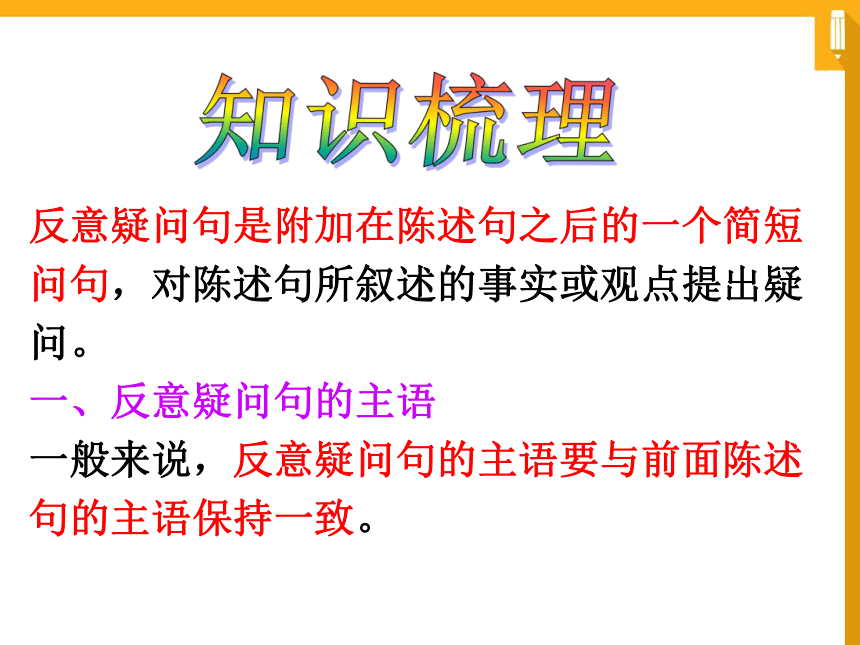
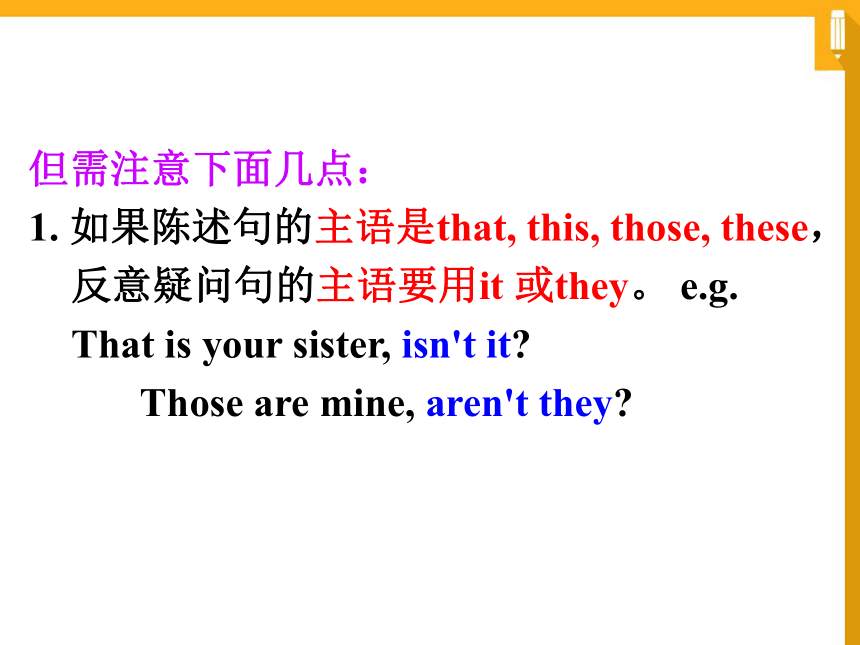
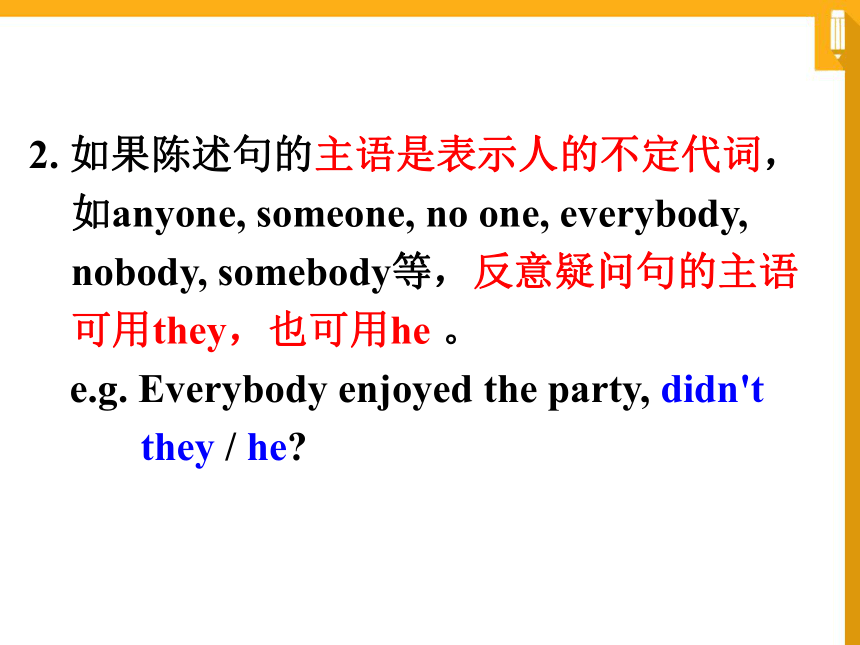
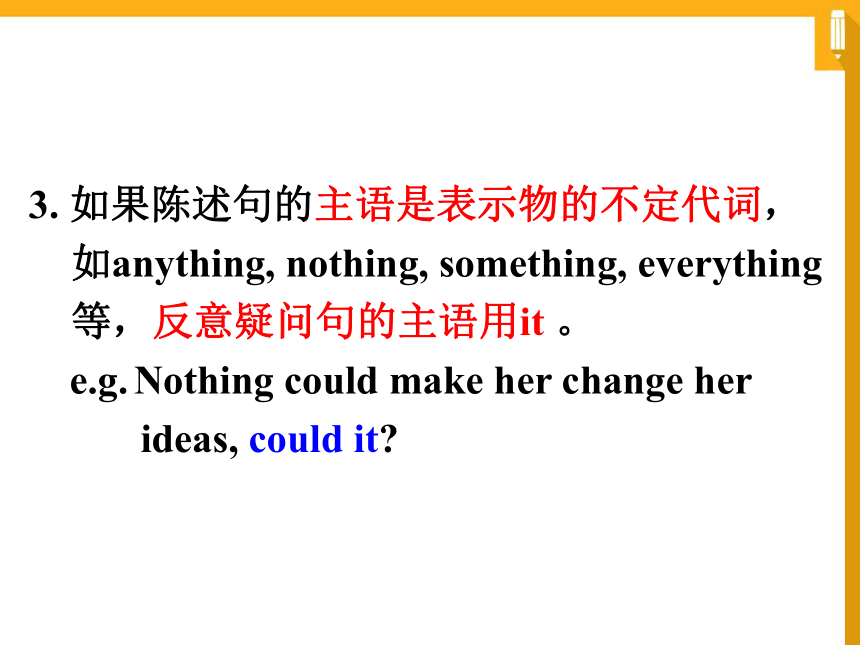

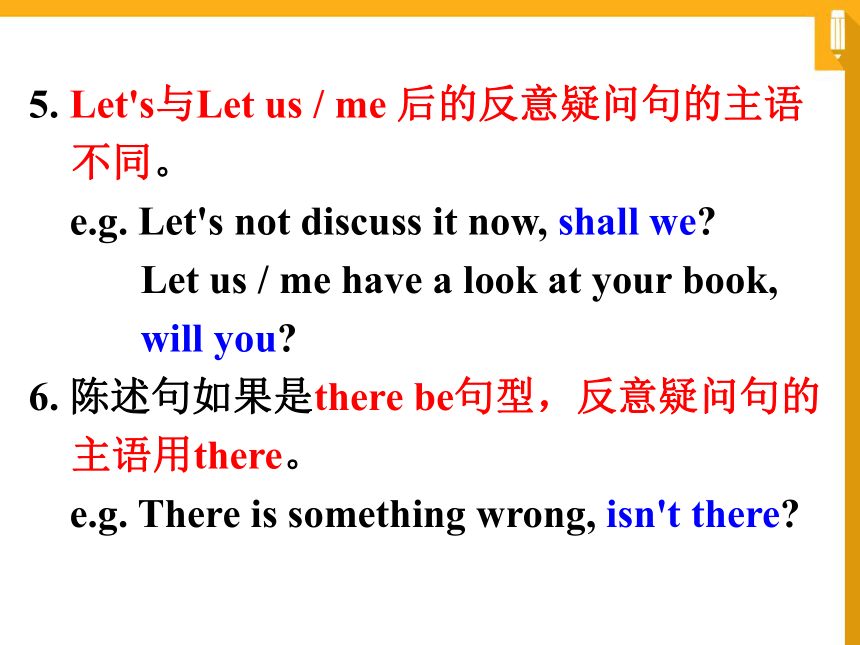
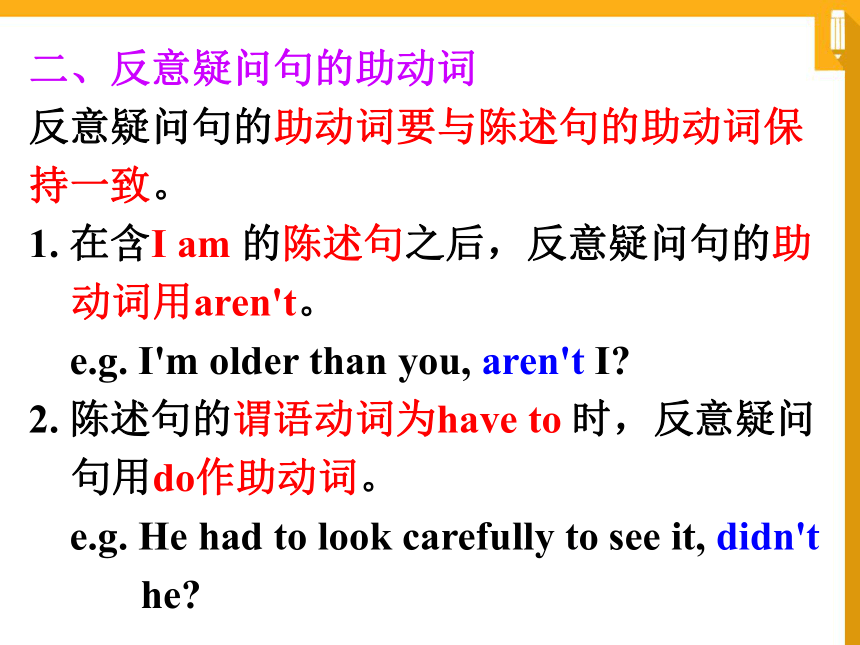
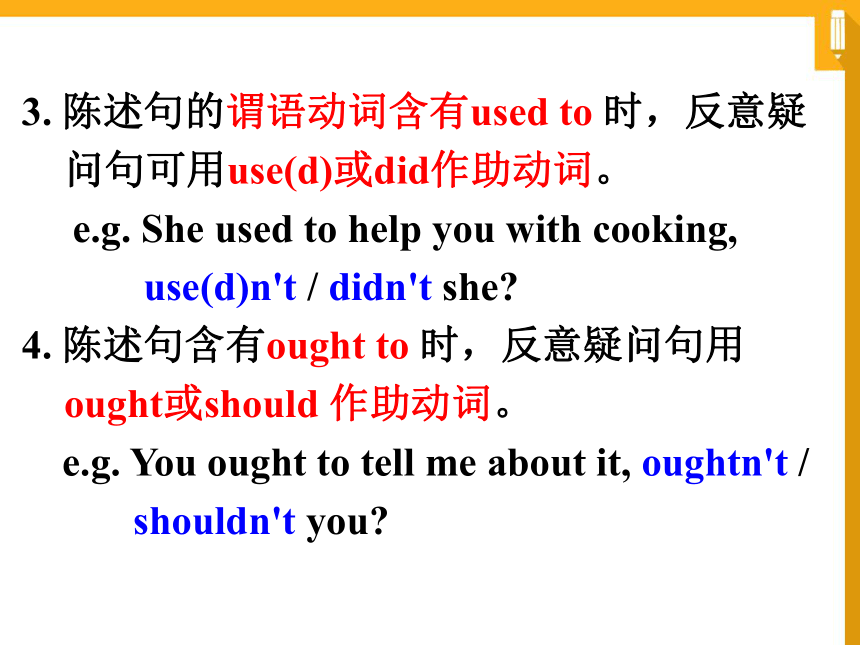
文档简介
(共25张PPT)
反意疑问句是附加在陈述句之后的一个简短
问句,对陈述句所叙述的事实或观点提出疑问。
一、反意疑问句的主语
一般来说,反意疑问句的主语要与前面陈述
句的主语保持一致。
但需注意下面几点:
1. 如果陈述句的主语是that, this, those, these,反意疑问句的主语要用it 或they。 e.g. That is your sister, isn't it
Those are mine, aren't they
2. 如果陈述句的主语是表示人的不定代词,如anyone, someone, no one, everybody, nobody, somebody等,反意疑问句的主语可用they,也可用he 。
e.g. Everybody enjoyed the party, didn't
they / he
3. 如果陈述句的主语是表示物的不定代词,如anything, nothing, something, everything 等,反意疑问句的主语用it 。
e.g. Nothing could make her change her
ideas, could it
4. 如果陈述句的主语是非谓语动词或主语从句,反意疑问句的主语用it 。
e.g. Learning how to repair motors takes a
long time, doesn't it
That he missed the exam made his
parents worried, didn't it
5. Let's与Let us / me 后的反意疑问句的主语不同。
e.g. Let's not discuss it now, shall we
Let us / me have a look at your book,
will you
6. 陈述句如果是there be句型,反意疑问句的主语用there。
e.g. There is something wrong, isn't there
二、反意疑问句的助动词
反意疑问句的助动词要与陈述句的助动词保
持一致。
1. 在含I am 的陈述句之后,反意疑问句的助动词用aren't。
e.g. I'm older than you, aren't I
2. 陈述句的谓语动词为have to 时,反意疑问句用do作助动词。
e.g. He had to look carefully to see it, didn't
he
3. 陈述句的谓语动词含有used to 时,反意疑问句可用use(d)或did作助动词。
e.g. She used to help you with cooking,
use(d)n't / didn't she
4. 陈述句含有ought to 时,反意疑问句用ought或should 作助动词。
e.g. You ought to tell me about it, oughtn't /
shouldn't you
5. 当陈述句中有实义动词dare或need 时,反意疑问句用do作助动词;
当陈述句中有情态动词dare或need 时,反意疑问句仍用这两个词作助动词。
e.g. They don 't dare to come, do they
They dare not come, dare they
6. 陈述句中有情态动词must 时,反意疑问句用什么样的助动词依must 的含义而定:
1) must 意为“一定,准是”时,反意疑问句中的助动词要与must 后面的动词相照应,但有时亦可用mustn't。
当陈述句谓语是must have done,且句中有明确的表示过去的时间状语时,反意疑问句用did或must 作助动词。
He must be very tired, isn't / mustn't he
He must have waited here for a long time, hasn't /mustn't he
(没有表示过去的时间状语)
You must have seen the play last week, didn't / mustn't you
(带有表示过去的时间状语)
2) must 意为“必须”时,反意疑问句中的助动词可用needn't 或mustn't。如:
e.g. You must go home right now, needn't /
mustn't you
3) mustn't 意为“禁止”时,反意疑问句中的助动词要用may。
e.g. The children mustn't play in the street,
may they
三、反意疑问句用肯定还是否定
陈述句是肯定句,反意疑问句用否定式;
陈述句是否定句,反意疑问句用肯定式。
如果陈述句含有表示否定或半否定意义的单词,如not, no, never, none, little, seldom, hardly, few, nowhere, nothing等,这个句子被看成否定句,反意疑问句用肯定式。
e.g. She seldom goes to the cinema, does she
四、陈述句是主从复合句或其它句子时的
反意疑问句
1. 陈述句是主从复合句时,反意疑问句通常与主句保持一致。但主句中如果有I think / believe / suppose等时,反意疑问句应与其宾语从句保持一致。
e.g. She says that I did it, doesn't she
I don't think he is right, is he
2. 陈述句是并列句时,反意疑问句与后一个分句保持一致。
e.g. She pretended to be angry, but she
was not, was she
3. 感叹句的反意疑问句通常用否定式,助动词一般用be 。
e.g. How well the job has been done,
isn’t it
4. 祈使句的反意疑问句通常用will 或can 作助动词。祈使句为肯定句时,反意疑问句常用will /won't / can / can't you;祈使句为否定句,反意疑问句则常用will / can you。
e.g. Carry this box for me, will / won’t /
can / can’t you
Don't forget to phone me, will / can you
从A、B、C、D四个选项中, 选出可以填入空白处的最佳选项。
—I spent two weeks in London last summer.
—Then you must have visited the British
Museum during your stay, _____ you (重
庆2014)
A. mustn’t B. haven’t
C. didn’t D. hadn’t
I. 用反意疑问句补全下面句子。
1. You have to arrive before half past eight, ____________
2. That's the shop where you used to work, ________
3. You would tell me if you knew, ____________
4. That 's the guy who was on TV the other night, ________
don't you
isn't it
wouldn't you
isn't it
5. She won't be here for another hour,
________
6. You may think you know the answer but you don't, ________
7. After working so hard he didn't deserve to fail the exam, ________
8. There is a lot of work to do today, ___________
9. You don't happen to know if the No. 50
bus has already passed here, ________
will she
do you
did he
isn't there
do you
II.从A、B、C、D 四个选项中选出正确的
句子。
1. A. Birds rarely build nests in our garden, don' t they
B. As a student, you used to work part-time at a coffee shop, didn't you
C. Judging by the smell, the food must be good, is it
D. You used to be in the same history class as me, weren't you
B
2. A. Nobody is absent today, aren't they
B. This pie looks delicious, isn't it It 's making my mouth water.
C. We can pick up a bottle of milk on the way home, can't we
D. That's a new pair of boots, are they
C
3. A. You couldn't recommend a good place to have a quick meal, can you
B. You weren't paying attention to me, are you
C. It 's cold today, so wear warm clothing, will you
D. You've never come to this park before, did you
C
反意疑问句是附加在陈述句之后的一个简短
问句,对陈述句所叙述的事实或观点提出疑问。
一、反意疑问句的主语
一般来说,反意疑问句的主语要与前面陈述
句的主语保持一致。
但需注意下面几点:
1. 如果陈述句的主语是that, this, those, these,反意疑问句的主语要用it 或they。 e.g. That is your sister, isn't it
Those are mine, aren't they
2. 如果陈述句的主语是表示人的不定代词,如anyone, someone, no one, everybody, nobody, somebody等,反意疑问句的主语可用they,也可用he 。
e.g. Everybody enjoyed the party, didn't
they / he
3. 如果陈述句的主语是表示物的不定代词,如anything, nothing, something, everything 等,反意疑问句的主语用it 。
e.g. Nothing could make her change her
ideas, could it
4. 如果陈述句的主语是非谓语动词或主语从句,反意疑问句的主语用it 。
e.g. Learning how to repair motors takes a
long time, doesn't it
That he missed the exam made his
parents worried, didn't it
5. Let's与Let us / me 后的反意疑问句的主语不同。
e.g. Let's not discuss it now, shall we
Let us / me have a look at your book,
will you
6. 陈述句如果是there be句型,反意疑问句的主语用there。
e.g. There is something wrong, isn't there
二、反意疑问句的助动词
反意疑问句的助动词要与陈述句的助动词保
持一致。
1. 在含I am 的陈述句之后,反意疑问句的助动词用aren't。
e.g. I'm older than you, aren't I
2. 陈述句的谓语动词为have to 时,反意疑问句用do作助动词。
e.g. He had to look carefully to see it, didn't
he
3. 陈述句的谓语动词含有used to 时,反意疑问句可用use(d)或did作助动词。
e.g. She used to help you with cooking,
use(d)n't / didn't she
4. 陈述句含有ought to 时,反意疑问句用ought或should 作助动词。
e.g. You ought to tell me about it, oughtn't /
shouldn't you
5. 当陈述句中有实义动词dare或need 时,反意疑问句用do作助动词;
当陈述句中有情态动词dare或need 时,反意疑问句仍用这两个词作助动词。
e.g. They don 't dare to come, do they
They dare not come, dare they
6. 陈述句中有情态动词must 时,反意疑问句用什么样的助动词依must 的含义而定:
1) must 意为“一定,准是”时,反意疑问句中的助动词要与must 后面的动词相照应,但有时亦可用mustn't。
当陈述句谓语是must have done,且句中有明确的表示过去的时间状语时,反意疑问句用did或must 作助动词。
He must be very tired, isn't / mustn't he
He must have waited here for a long time, hasn't /mustn't he
(没有表示过去的时间状语)
You must have seen the play last week, didn't / mustn't you
(带有表示过去的时间状语)
2) must 意为“必须”时,反意疑问句中的助动词可用needn't 或mustn't。如:
e.g. You must go home right now, needn't /
mustn't you
3) mustn't 意为“禁止”时,反意疑问句中的助动词要用may。
e.g. The children mustn't play in the street,
may they
三、反意疑问句用肯定还是否定
陈述句是肯定句,反意疑问句用否定式;
陈述句是否定句,反意疑问句用肯定式。
如果陈述句含有表示否定或半否定意义的单词,如not, no, never, none, little, seldom, hardly, few, nowhere, nothing等,这个句子被看成否定句,反意疑问句用肯定式。
e.g. She seldom goes to the cinema, does she
四、陈述句是主从复合句或其它句子时的
反意疑问句
1. 陈述句是主从复合句时,反意疑问句通常与主句保持一致。但主句中如果有I think / believe / suppose等时,反意疑问句应与其宾语从句保持一致。
e.g. She says that I did it, doesn't she
I don't think he is right, is he
2. 陈述句是并列句时,反意疑问句与后一个分句保持一致。
e.g. She pretended to be angry, but she
was not, was she
3. 感叹句的反意疑问句通常用否定式,助动词一般用be 。
e.g. How well the job has been done,
isn’t it
4. 祈使句的反意疑问句通常用will 或can 作助动词。祈使句为肯定句时,反意疑问句常用will /won't / can / can't you;祈使句为否定句,反意疑问句则常用will / can you。
e.g. Carry this box for me, will / won’t /
can / can’t you
Don't forget to phone me, will / can you
从A、B、C、D四个选项中, 选出可以填入空白处的最佳选项。
—I spent two weeks in London last summer.
—Then you must have visited the British
Museum during your stay, _____ you (重
庆2014)
A. mustn’t B. haven’t
C. didn’t D. hadn’t
I. 用反意疑问句补全下面句子。
1. You have to arrive before half past eight, ____________
2. That's the shop where you used to work, ________
3. You would tell me if you knew, ____________
4. That 's the guy who was on TV the other night, ________
don't you
isn't it
wouldn't you
isn't it
5. She won't be here for another hour,
________
6. You may think you know the answer but you don't, ________
7. After working so hard he didn't deserve to fail the exam, ________
8. There is a lot of work to do today, ___________
9. You don't happen to know if the No. 50
bus has already passed here, ________
will she
do you
did he
isn't there
do you
II.从A、B、C、D 四个选项中选出正确的
句子。
1. A. Birds rarely build nests in our garden, don' t they
B. As a student, you used to work part-time at a coffee shop, didn't you
C. Judging by the smell, the food must be good, is it
D. You used to be in the same history class as me, weren't you
B
2. A. Nobody is absent today, aren't they
B. This pie looks delicious, isn't it It 's making my mouth water.
C. We can pick up a bottle of milk on the way home, can't we
D. That's a new pair of boots, are they
C
3. A. You couldn't recommend a good place to have a quick meal, can you
B. You weren't paying attention to me, are you
C. It 's cold today, so wear warm clothing, will you
D. You've never come to this park before, did you
C
